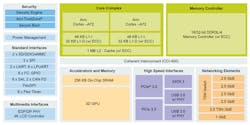Download this article in PDF format.
Microprocessors and microcontrollers have been with us for well over 40 years. Great advances in architecture and semiconductor processing have given us increasingly more power and versatility over the years. These processors range from the inexpensive 8-bit embedded controllers to the 32- and 64-bit monsters that clock at rates well beyond 4 Gb/s. Their generic programmable nature has made most modern electronic products possible. Yet, these devices continue to evolve to meet cutting-edge demands.
One major trend is to create specialized systems-on-chip (SoCs) with a processor base that’s been optimized for some particular market or specialty. Graphics processors are an example. These devices have also been identified as excellent machine-learning processors for AI applications.
Then there are the processor-based SoCs that clearly zero in on a specific application. Such devices feature powerful generic processors but come with a rich feature set of interfaces, coprocessors, and other circuitry that makes them particularly useful in selected technology specialties.
An illustration of this is NXP’s Layerscape family of applications processors that target the industrial sector. These customized SoCs help make the design of industrial products faster and easier.
Sponsored Resources:
- Layerscape® LS1028A Family of Industrial Applications Processors
- New Technologies Upgrade Industrial Networks
- Time Sensitive Networking with the Layerscape LS1028A
The Importance of Determinism in Factory Automation
Many if not most industrial equipment that’s networked requires determinism. Determinism means being able to determine when an event will take place after some initial command is given.
The need for determinism in Industry 4.0 use cases is caused by latency. Latency is the time between some stimulation and the expected response. It varies widely from microseconds to seconds depending on the system and the medium involved in transporting the commands for action. Factory automation must usually be in real time or close to it. Many operations are the result of the response time of machines carrying out the work. Robots are particularly time sensitive.
Factory operations rely on being able to determine when something is going to happen. That’s why determinism is an essential feature of a networking system connecting computers and machines.
The network of choice for most factory automation is industrial Ethernet. This is a rugged industrialized version of the ubiquitous Ethernet that dominates networking. The problem is that Ethernet isn’t naturally a deterministic network—it wasn’t designed to have such an attribute. However, that problem has been solved with a fix called time-sensitive networking (TSN).
TSN is an IEEE standard (802.1Q) designed to provide deterministic messaging over Ethernet. It’s a centrally controlled technology that guarantees the time of delivery of commands over the network. It fully meets the timing needs of real-time industrial operations.
TSN’s operation ensures that data can be sent from point X to point Y in a fixed and predictable amount of time. It works with IEEE’s 1588 Precision Time Protocol (PTP) to keep timing correct and accurate. The standard is a necessity in any processor-based machine or product used in industry.
One benefit of TSN is that it allows networked automated machines and industrial equipment, referred to as the operation technology (OT), to be connected to the company’s information technology (IT) system, which includes the usual inventory, logistics, and multiple management systems. The ability to bring these systems together significantly increases efficiency and factory throughput.
Such capability is possible thanks to the adoption of the Open Platform Communications with Unified Architecture (OPC-UA) system. This software runs on top of the Layer 2 TSN protocol.
Processors That Do TSN
One line of processors that fulfills the necessary TSN duties is NXP’s Layerscape. The Layerscape LS1028A family of industrial applications processors integrates TSN-enabled Ethernet networking, 3D graphics for human machine interfaces (HMIs), and high-performance PCIe Gen 3.0 and other high-speed interfaces. The SoC family supports 125°C junction temperature and industrial qualification. This feature makes possible industrial applications that require reliability and long life in challenging environments.
Features of the LS1028A family include:
- One or two Arm Cortex A72 processors
- 4-GB 32/26-bit DDR3/DDR4 RAM with ECC
- Internal GPU
- 1- and 2.5-Gb/s Ethernet with network switching.
- High-speed interfaces include PCIe 3.0, USB 3.0, and SATA 3
- Standard interfaces: Multiple ports of SPI, UART, CAN-FD, and GPIO
- Security engine
- Open Industrial Linux RTOS with TSN and IEEE 1588 support.
The figure shows a simplified block diagram of this SoC.
Here’s a simplified block diagram of the LS1028A SoC, which is targeted at industrial applications.
New Technologies Upgrade Industrial Networks
Some of the applications for this SoC include industrial PCs, programmable logic controllers, robot controllers, HMI for any of these products, IoT gateways, and others.
If you’re looking for a way to upgrade your industrial equipment to take advantage of TSN, OPC-UA and other benefits, consider the NXP Layerscape LS1028A reference design board. It’s a complete system with a preloaded Linux software-development kit. It can reduce development time and it provides a reference for developing a custom design.
Sponsored Resources:
- Layerscape® LS1028A Family of Industrial Applications Processors
- New Technologies Upgrade Industrial Networks
- Time Sensitive Networking with the Layerscape LS1028A
Related Resource:
About the Author

Lou Frenzel
Technical Contributing Editor
Lou Frenzel is a Contributing Technology Editor for Electronic Design Magazine where he writes articles and the blog Communique and other online material on the wireless, networking, and communications sectors. Lou interviews executives and engineers, attends conferences, and researches multiple areas. Lou has been writing in some capacity for ED since 2000.
Lou has 25+ years experience in the electronics industry as an engineer and manager. He has held VP level positions with Heathkit, McGraw Hill, and has 9 years of college teaching experience. Lou holds a bachelor’s degree from the University of Houston and a master’s degree from the University of Maryland. He is author of 28 books on computer and electronic subjects and lives in Bulverde, TX with his wife Joan. His website is www.loufrenzel.com.

